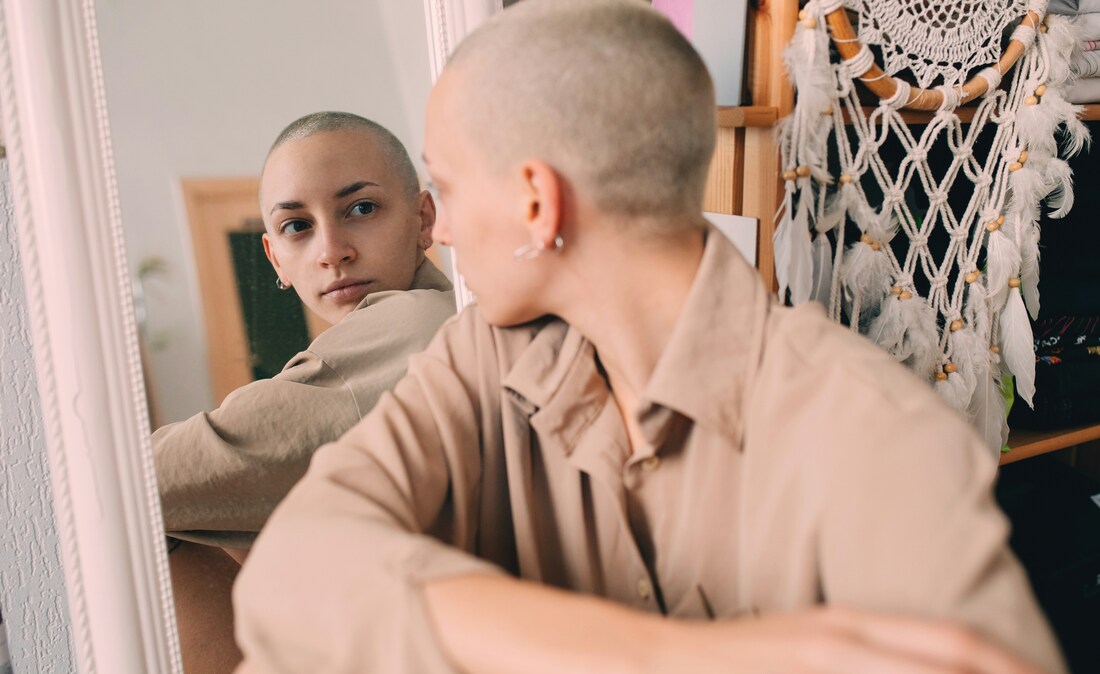|
An easy way to make this concept concrete, applicable to self & others  Photo of a person with razor-short hair gazing into in a mirror from getty images on Unsplash Photo of a person with razor-short hair gazing into in a mirror from getty images on Unsplash Consider first what unconditional love could look like directed toward the self. Below, I offer a list that contains two components followed down the line. We begin with a) a possible thing that makes you feel good about yourself and automatically creates a sense of self-love, followed each time by b) the flip side of that, which you generally don’t want and feel bad about—the stuff that stirs up self-disapproval and that sense of being wrong, unworthy, not good enough. Which can lead to all manner of what is not self-love, from walking around feeling subtly off and not quite up to par (without even verbalizing it, but it still feels bad, and it’s unfair to yourself) all the way to pure self-loathing and vicious self-talk (which feels rotten). What if you FULLY, equally, loved yourself in both the wanted & the unwanted aspects of your behavior? Of how you feel? Of how others see you? That’s unconditional self-love. Make it about others, and you’ve got unconditional love as directed to others. Want to love unconditionally? Notice the conditions that get the inner or outer critic in motion. INTERRUPT THE CRITIC. Drop into love for what’s here right now, the good, the bad, the ugly. Consider whether you might at least try saying (writing!) that you love yourself on each end of any spectrum, and all the way across. I love myself when I feel great & strong in my body. I love myself when something hurts or feels tender, off, painful, fragile. I love myself when I’m strong & stable. I love myself when I’m wobbly. I love myself when I’m kind to [my mom] & soothe irritation that arises without expressing it. I love myself when I notice I’m being critical, unkind, mentioning what doesn’t need to be mentioned. I love myself when I’m inappropriately instructing & suggesting. I love myself when I feel the love & joy flowing effortlessly. I love myself when I’m not in the vicinity. I love myself when I show up to do processes (like inquiry, focus wheels, EFT), getting out ahead of old negative thought patterns before they can build momentum or wreak havoc. I love myself when I reach for those processes after I’ve reacted or thrown myself off in some way or even after I’ve gone wayyyy down the rabbit hole and must walk myself through the whole climb back to ground zero. I love myself when I’m happy & appreciating others & all of life.
I love myself when I’m sad & full of discontent. I love myself when people hold up beautiful mirrors telling me I’m great, brilliant, talented, loving. I love myself when someone looks at me funny or declares everything they think is wrong with me. I love myself when I pause and choose a kind, calm, clear response. I love myself when I’m reactive or triggered and don’t even know I’m puking on someone till the mess has already dropped. I love myself when I [do qigong] and grow the practice. I love myself when I skip it. I love myself when I’m [do qigong] in presence, consciously growing my relationship to presence. I love myself when I phone it in, just do it to get it done, call it good enough. I love myself when I just simply and easily say what’s true for me. I love myself when words get stuck in my throat or I tiptoe around the issue. Hey, to be clear, the idea isn’t to condone or excuse what feels off to you. It’s to love what’s actually there, reject no part of yourself. In fact, when you’re loving yourself in any current condition, you’ll be much more able to swiftly course-correct. You’ll feel what’s off and head toward alignment fast. Getting out judgments and filling the space with love makes thing clear and more spacious. There’s room to shift. Maybe you can see that better with others, and it’s just as true for yourself. I invite you to make your own list. You could approach it from either direction: instead of what I did above, you could start with a statement of loving the least-preferred part (especially if it’s present here & now) and go from there to the stuff that easily feels good). You could also sit down on a day you notice you’re carrying around a critical play-by-play narration of yourself or another or your day, job, whatever, and write out both parts. Get yourself squarely situated in the acceptance that you’re not your idealized self, and you don’t need to be. Love yourself (or another) in writing, and you’ll be able to love yourself (or another) in talk, in actions, in the day-to-day now-now-now of it. It’s always helpful to write your thoughts down on paper so you can see what they’re up to and write out what you prefer to think to support really taking it in. Writing helps with focusing. Focus yourself into unconditional love. Love & blessings, Jaya
0 Comments
Your comment will be posted after it is approved.
Leave a Reply. |
Categories
All
|
 RSS Feed
RSS Feed